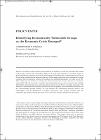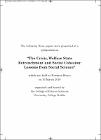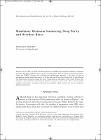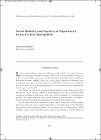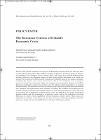Browsing The Economic and Social Review, Vol. 41, No. 4, Winter, 2010 by Title
Now showing items 1-5 of 5
-
Identifying economically vulnerable groups as the economic crisis emerged
(Economic & Social Studies, Dublin, 2010)A frequent refrain during recent debates on welfare cuts and tax increases has related to the need to ?protect the vulnerable?. However, it is far from clear that a consensus exists on which individuals or groups are to ... -
Inequality and the crisis: the distributional impact of tax increases and welfare and public sector pay cuts
(Economic & Social Studies, Dublin, 2010)The economic crisis impacts directly on the distribution of income via unemployment and private sector wages, but the way policy responds in seeking to control soaring fiscal deficits is also central to its distributional ... -
Mandatory minimum sentencing, drug purity and overdose rates
(Economic & Social Studies, Dublin, 2010)As of 1987, the US?s Anti-Drug Abuse Act (ADAA) has imposed mandatory minimum sentences for drug traffickers based on the quantity of the drug involved irrespective of purity. Using the STRIDE dataset and a differences- ... -
Social mobility and equality of opportunity
(Economic & Social Studies, Dublin, 2010)The idea of social mobility is closely linked to the concept of equality of opportunity: it is widely held that if there were greater equality of opportunity there would be more social mobility and, conversely, that more ... -
The European context of Ireland?s economic crisis
(Economic & Social Studies, Dublin, 2010)The current economic crisis has hit all European countries hard, but some are more severely affected than others. The problems manifest in European peripheral countries that are also members of the Eurozone, that is, ...




